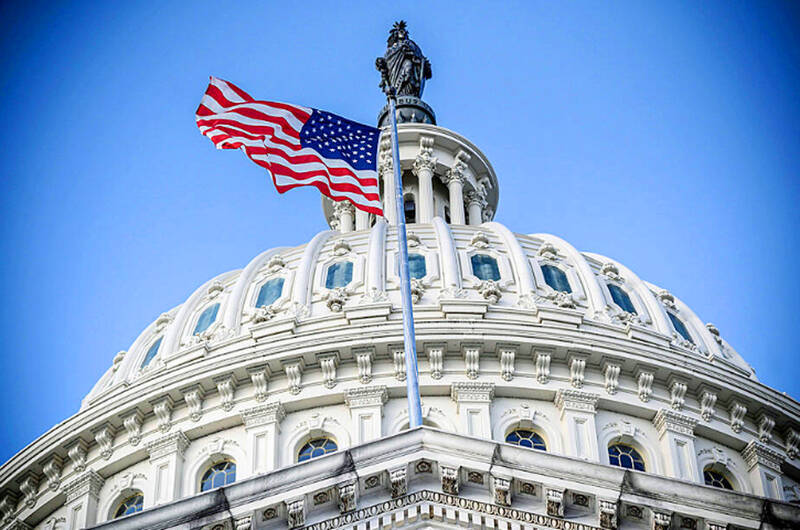The US House of Representatives yesterday passed the US-Taiwan Expedited Double-Tax Relief Act by a 423 to 1 vote.
The bill is to be first sent to the US Senate to vote on before being sent to the US president for his signature to be passed into legislation.
The act would first exempt taxation for qualified Taiwanese residents who provide services in the US, and offer a lower withholding tax rate for qualified Taiwanese residents with particular types of US-sourced income such as dividends or interest.

Photo: AFP
Second, the United States-Taiwan Tax Agreement Authorization Act would improve tax cooperation between the two countries, granting the US president authority to negotiate and establish a tax agreement with Taiwan.
Taiwan has been pushing for a double taxation agreement in recent years to benefit businesses on both sides of the Pacific.
It failed to pass in the previous session.
The act “paves the way for increased Taiwanese investment in the US economy,” the New Democrat Coalition of the House said in a joint statement.
As the US and Taiwan have no formal diplomatic relations, for decades there have been no tax agreement, forcing individuals to pay taxes to both governments if they live or work in both nations and giving Taiwanese businesses “an excessively high withholding tax when compared to other close trading partners,” the coalition said.
The bill aims to “lower costs on cross-border investment, help expand domestic production of key technologies including chips and create high-paying jobs in communities across the [US],” it said.
As Taiwan is one of the US’ largest trade partners, the act would “unleash American manufacturing jobs, support [US] semiconductor and chip manufacturing capabilities and secure strategic supply chains, while reducing [US] dependence on China,” House Committee on Ways and Means Chairman Jason Smith wrote on X.
Without the agreement, US employees sent to Taiwan for training at semiconductor factories would have to pay double taxes on their income, US House Representative Judy Chu (趙美心) said.
The US has already signed double taxation agreements with more than 60 countries, but due to Taiwan’s unique political position it cannot partake in traditional tax agreements, making Taiwan the only one of the US’ top 10 trade partners without such an agreement, she added.
Chu said that Taiwanese businesses have told her that in the face of large tax bills, they have reduced investment in the US.
A survey conducted by the American Institute in Taiwan found that 79 percent of respondents agreed that double taxation was a deterrent to US investments, she added.
In light of the House passing the bill, President William Lai (賴清德) said he hoped that Legislative Speaker Han Kuo-yu (韓國瑜), who is leading a delegation to attend the US presidential inauguration next week, could mark this new milestone in Taiwan-US relations in Washington.

US President Donald Trump yesterday announced sweeping "reciprocal tariffs" on US trading partners, including a 32 percent tax on goods from Taiwan that is set to take effect on Wednesday. At a Rose Garden event, Trump declared a 10 percent baseline tax on imports from all countries, with the White House saying it would take effect on Saturday. Countries with larger trade surpluses with the US would face higher duties beginning on Wednesday, including Taiwan (32 percent), China (34 percent), Japan (24 percent), South Korea (25 percent), Vietnam (46 percent) and Thailand (36 percent). Canada and Mexico, the two largest US trading

AIR SUPPORT: The Ministry of National Defense thanked the US for the delivery, adding that it was an indicator of the White House’s commitment to the Taiwan Relations Act Deputy Minister of National Defense Po Horng-huei (柏鴻輝) and Representative to the US Alexander Yui on Friday attended a delivery ceremony for the first of Taiwan’s long-awaited 66 F-16C/D Block 70 jets at a Lockheed Martin Corp factory in Greenville, South Carolina. “We are so proud to be the global home of the F-16 and to support Taiwan’s air defense capabilities,” US Representative William Timmons wrote on X, alongside a photograph of Taiwanese and US officials at the event. The F-16C/D Block 70 jets Taiwan ordered have the same capabilities as aircraft that had been upgraded to F-16Vs. The batch of Lockheed Martin

GRIDLOCK: The National Fire Agency’s Special Search and Rescue team is on standby to travel to the countries to help out with the rescue effort A powerful earthquake rocked Myanmar and neighboring Thailand yesterday, killing at least three people in Bangkok and burying dozens when a high-rise building under construction collapsed. Footage shared on social media from Myanmar’s second-largest city showed widespread destruction, raising fears that many were trapped under the rubble or killed. The magnitude 7.7 earthquake, with an epicenter near Mandalay in Myanmar, struck at midday and was followed by a strong magnitude 6.4 aftershock. The extent of death, injury and destruction — especially in Myanmar, which is embroiled in a civil war and where information is tightly controlled at the best of times —

China's military today said it began joint army, navy and rocket force exercises around Taiwan to "serve as a stern warning and powerful deterrent against Taiwanese independence," calling President William Lai (賴清德) a "parasite." The exercises come after Lai called Beijing a "foreign hostile force" last month. More than 10 Chinese military ships approached close to Taiwan's 24 nautical mile (44.4km) contiguous zone this morning and Taiwan sent its own warships to respond, two senior Taiwanese officials said. Taiwan has not yet detected any live fire by the Chinese military so far, one of the officials said. The drills took place after US Secretary